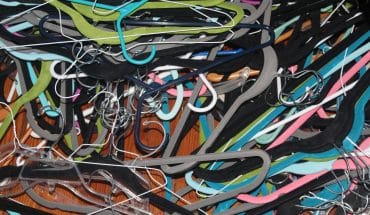An environmental specialist Mel Gilles shares how she came to her eco-conscious lifestyle.
by Andrea Rice | photography by Jillian Clark
The term “zero-waste” can sound extreme—but Mel Gilles, the Recycling Education and Outreach Coordinator for the Division of Environmental Assistance and Customer Service (DEACS) at the North Carolina Department of Environmental Quality, argues that it doesn’t have to be such a feat. We spoke about her career in recycling and how she reduces her impact.
When did you first get interested in the environment?
I grew up all over and landed in Greensboro. When I was about nine years old, I was in a shopping mall and had a panic attack seeing all the women going through the racks. I didn’t understand where all that clothing went if it wasn’t bought, and I was already concerned about the amount of stuff we were making in the world. I had to leave. I started thrift store shopping then, before zero-waste was even a thing.
How did you turn that epiphany into a career?
I helped start a recycling program at my high school, Grimsley High, in 1986—curbside recycling began in ‘87—mostly because I needed an act of teenage rebellion and combat boots just weren’t cutting it. My friends and I brought a blue recycling bin to school and started collecting white office paper. From there, I worked at nonprofits, running organizations that had a flow of goods, like food programs and shelters, and a big thrift store in Moab, Utah. These places were always receiving donations, some of which had nowhere to go. I spent about 15 years trying to get stuff to people who needed it, while also figuring out how to get rid of stuff people didn’t need without throwing it away.
By 2012, only 20 percent of clothing could be resold because of fast fashion; cheaply-made clothing would only last one season. We were receiving so much stuff that I didn’t know what to do with it, so I called Eco-Cycle, one of the oldest recycling nonprofits in the country. Next thing I knew, I was moving to Boulder, Colorado to work with them, and was in charge of corporate outreach to help large companies like Whole Foods and Google divert their waste streams.
What do you do for the DEACS?
My job is to educate folks about recycling. We offer technical assistance to local government programs, so everything from grants to advising them on how to get their programs more established and improved. We offer enforcement technique strategies, like giving residents real-time feedback with a little tag that says what they put in the bin that was incorrect.
What was the Recycle Right NC campaign that you helped launch last year?
We put together a compendium of social media posts, press releases, fact sheets and tool kits for local governments to get the message out about how to recycle the right way to help get contamination down. A statewide recycling campaign that was that extensive had not been done before. The campaign has since been picked up by other states in the Southeast.
Do you consider yourself a zero-waste pioneer?
I wouldn’t say so—I think of myself as pragmatic. To me it just made sense: Why would I need to keep getting a bigger job just to pay for more consumption? If we are producing that much waste, then something’s wrong, because there are a lot of people who don’t even have enough of the basics.
How do you cut back on your own waste?
Most of the stuff I do is easy: Repair what you can and keep an item’s shelf life going. Don’t keep trading in your phone. I’ve shopped at consignment and thrift stores for decades and have zero guilt about the money I spend—and it makes my fashion sense a lot more interesting! I just do the best I can. While I try not to buy anything in plastic, I do sometimes end up with a to-go cup or a single-use water bottle.
What does reduction mean to you?
I don’t want someone standing at a bin trying to figure out where the packaging goes after they’ve consumed the product—I want them thinking about the packaging before they buy the product. Make the best choice you can given your family’s needs and your budget, and try to make the better choice one out of every two times.
This interview has been lightly edited for clarity and space.





